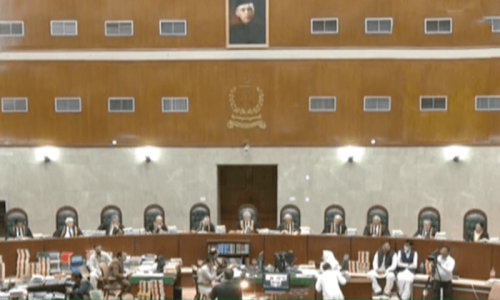ISLAMABAD: The latest judgement providing a right to appeal, but eliminating the retrospective effect of the law, in cases decided under Article 184(3) has divided the legal community, which hotly debated the ramifications of this decision for PML-N supreme leader Nawaz Sharif, on Wednesday.
Lawyer Mohammad Ikram Chaudhry told Dawn that in decisions in which a review has not been filed, an application could be moved for “condonation of delay which is an exemption to the general rule…[and] indicates that a court may agree to accept a late appeal or application”.
Mohammad Akram Sheikh said that as per the limitation law, a review could be sought within 30 days of the pronouncement of the judgement. He said in some cases, the apex court had condoned a delay. He, however, said that the applicant would have to explain the reasons for the delay.
Senior lawyer Raja Inam Ameen Minhas said a review petition of the Supreme Court Bar Association is pending with the Supreme Court against the disqualification of the politicians.
According to him, since the matter of disqualification of the lawmaker was still pending; therefore, it is “still an appealable matter.”
Former PM’s special assistant on law Barrister Zafarullah Khan said that the Supreme Court’s decision would not affect the cases of Mr Sharif since he was not seeking relief from the apex court.
He said Mr Sharif would pursue his appeals against conviction and the matter would ultimately reach the apex court where the judgement of the Panama Papers case will also come under judicial scrutiny.
Some lawyers thought the decision was a setback for the elder Sharif, who – after four years in London – decided to come back to Lahore on Oct 21.
Advocate Abdul Moiz Jaferii in a tweet said, “Nawaz Sharif…lost the one section which could have helped him, the retrospective appeal. PTI lost its petitions.”
Former AAG Tariq Mahmood Khokhar agreed, saying the judgement was a setback for the PML-N generally and a blow to Mian Nawaz Sharif personally.
By declaring Section 5(2) of the act (grant of right of appeal retroactively) to be ultra vires, the lifetime disqualification in the Panama case retains its finality.
But Advocate Usama Khawar said for the moment, Nawaz Sharif and Jehangir Khan Tareen can contest elections due to an amendment to Section 232 of the Election Act, 2017.
The amendment limits the disqualification period under Article 62(1)(f) to five years, which contradicts the Supreme Court’s judgment that holds the disqualification under Article 62(1)(f) for life.
However, this amendment can be challenged in court as it contradicts the Supreme Court’s judgement that holds the disqualification under Article 62(1)(f) for life.
In order to prevent Nawaz Sharif from contesting the election, the Lahore High Court or the Supreme Court must declare the amendment as unconstitutional.
Alternatively, the apex court can take up the petition of the Pakistan Bar Council led by Ahsan Bhoon challenging the lifetime disqualification of parliamentarians. However, this might not be as easy, legally and politically, as it might sound, he said.
Lawyer Muhammad Ahmad Pansota said Nawaz Sharif could not benefit from the ruling. “He cannot file an appeal against his Panama disqualification. However, through an act of Parliament, disqualification under 62(1)(f) has been limited to five years, which have lapsed. But interestingly, this legislation is in direct conflict with a Supreme Court judgement. It will get interesting once he files his nomination papers in the elections,” Mr Pansota said.
Published in Dawn, October 12th, 2023














































Dear visitor, the comments section is undergoing an overhaul and will return soon.